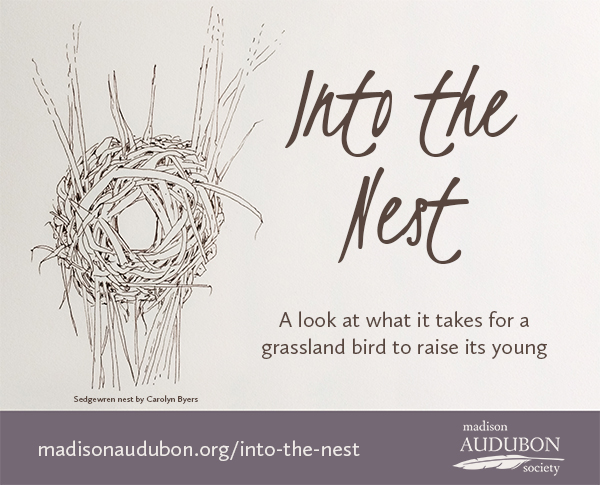This series highlights the fascinating and marvelous ecology of grassland bird nesting, written by Madison Audubon education director Carolyn Byers. Click here for all Into the Nest posts.
Into the Nest: Remember how beautiful eggs are?
It's been a little bit since we've peeked Into the Nest of grassland birds. But not because of a lack of interesting stuff to talk about! We are working on a run down of everyone's favorite topic: poop; you won't want to miss the upcoming post on fecal sacs.
In the meantime, feast your eyes on these awesome eggs. The size, shape, color pattern are all unique to the species they come from. Learn more about how grassland birds lay their clutch of beautiful eggs in our Into the Nest post from May 31: There is nothing so beautiful as a bird's egg.
Grassland bird egg painting, species from left to right:
Top two: upland sandpiper, Henslow's sparrow
Middle four: savannah sparrow, bobolink, grasshopper sparrow, eastern meadowlark
Bottom two: dickcissel, northern harrier
The original painting has the eggs approximately 2x their actual size. So the upland sandpiper egg in the upper left, while painted at 2.5" wide, would be closer to 1.75" wide life-sized. Similarly, the little dickcissel egg on the bottom left looks small as it is, but would come in at a mere 1" wide when found in the nest. Sweet lil' thangs.
Painting by Carolyn Byers
* * * * * * * * * * * * * * * * * * * * * * * *
Dickcissels are a beautiful, migratory grassland bird that benefits from the Migratory Bird Treaty Act. Photo by Kelly Colgan Azar
This summer, to celebrate Year of the Birdand 100 years of bird conservation under the Migratory Bird Treaty Act, we’ll be posting regular articles about grassland bird nesting ecology. My M.S. thesis focused on grassland bird nesting ecology, and I’m excited to share my knowledge—and stories from the field- with you! We’ll go into the nest to learn about chick behavior, adult sleep habits, feeding and fledging. We’ll discuss predation and learn about how adult birds respond to different predators. You’ll get to see beautiful photos of nests, eggs, and chicks, as well as video footage straight from the nest! Best of all, the next time you’re out hiking in your favorite Wisconsin prairie, you’ll feel a bit closer to the birds you love.
If you’re interested in reading more and can’t wait for the next post, you can read more about my thesis work here.
Stay tuned for our next edition of Into the Nest, coming soon!
Written by Carolyn Byers, Madison Audubon education director







